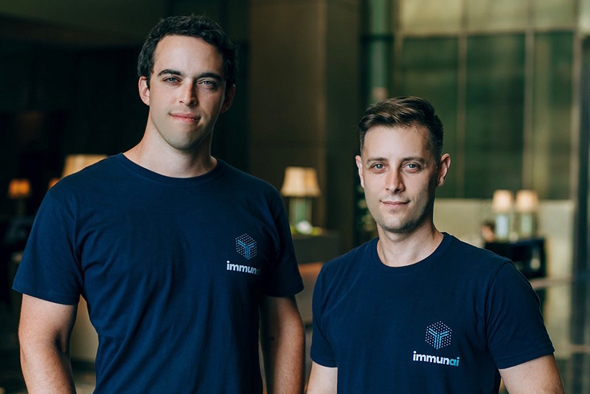Immunai Announces $20 Million Seed Round to Fund Immune System Mapping
The company employs more than 30 workers in Israel and New York and collaborates with more than 10 world-leading medical centers and bio-pharma companies
19:2314.05.20
Biotech company Immunai announced on Thursday that it had completed a $20 million seed round led by Viola Ventures and TLV Partners. The company is developing a technological platform that aims to map the entire immune system for better detection, diagnosis, and treatment of disease.
Immunai was founded in January 2019 by Noam Solomon (CEO) and Luis Voloch (CTO) who were joined by Ansuman Satpathy, a professor of cancer immunology at Stanford University, Danny Wells, a current member of the Parker Institute for Cancer Immunotherapy, and Dan Littman, a professor of molecular immunology at New York University, all three of whom joined the team as founding scientists.

Immunai co-founders Noam Solomon (right) and Luis Voloch. Photo: Gil Kovalchickצילום: גיל קובלצ'יק
Immunai has developed a vertically-integrated platform for multi-omic single-cell profiling that offers a broader view of the immune system in states of health, disease, and treatment to examine the body’s response to various treatments. With Immunai’s platform, pharmaceutical companies can identify more subtle nuances in cell abundances and cell function and mechanisms of action and biomarkers for toxicity response to accurately measure the efficacy of immunotherapies.
Leveraging single-cell technologies and machine learning algorithms, Immunai has mapped out millions of immune cells and their functions, building the largest proprietary data set in the world for clinical immunological data.
”When looking only at a specific disease or patient cohort, one gets a limited and siloed view of the immune system,” Solomon said in a statement. “By using machine learning and applying it to our proprietary diverse database of single-sequencing data paired with rich clinical data, our platform identifies common patterns that are not visible when looking at the narrower disease-specific view. To put it differently, our technology enables immunological research to go from looking at a grainy 'black and white' image to a rich and multi-faceted colored photo.”
Immunai employs more than 30 workers in Israel and New York and collaborates with more than 10 world-leading medical centers and bio-pharma companies.



